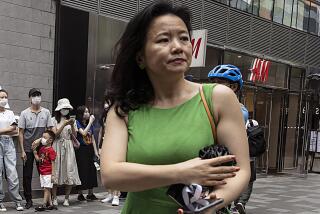China Frees Dissident Poet, Orders His Return to U.S.
BEIJING — Chinese police released the Boston-based editor of a dissident literary magazine on Saturday and sent him back to the United States, removing an irritant in shaky but improving China-U.S. ties.
The editor, Bei Ling, arrived in San Francisco on Saturday. As he left Beijing, Bei said Chinese and U.S. diplomats arranged his release to smooth the way for President Jiang Zemin’s trip to New York next month for a U.N. summit and talks with President Clinton.
Police also freed Bei’s brother, Huang Feng, late Friday, a little more than a week after he was detained as part of the investigation.
Bei’s arrest Aug. 11 drew angry publicity in the United States that threatened to undo months of diplomacy aimed at repairing ties between the countries. Well-known authors demanded his release in essays in major U.S. newspapers.
Bei, a poet, has lived in the United States since 1988. He has edited the literary journal Tendency, and he and others have routinely smuggled copies of the journal into China for distribution among Chinese intellectuals.
Bei irked China’s Communist authorities by publishing the work of underground writers. He agreed to leave China as a condition for his release, and it was uncertain when he would be allowed to return. Police put him on an Air China flight bound for San Francisco.
“I have to leave. I have no choice,” Bei said at the departure hall of Beijing’s airport. “If I didn’t leave, I would have gone to jail.”
Bei, 40, said that he was not mistreated while in detention and that he had eaten well and the prison was fairly clean.
His arrest came amid a broadening crackdown by the Communist regime on the publishing industry. The regime fears that criticisms of the government and calls for political change, however mild, could further incite workers and farmers already protesting corruption, layoffs, taxes and stagnating incomes.
In a provocative move that he later called naive, Bei had 2,000 copies of the August issue of Tendency printed in Beijing.
The issue included works by Nobel Prize-winning Irish poet Seamus Heaney, an introduction to underground Chinese literature and a poem by Liu Xiaobo, a dissident literary critic. It also contained a photo of Wang Dan, a leader of the 1989 Tiananmen Square democracy protests.
Bei said police accused him of illegal publishing and told him that if he refused to go to the U.S. he would face three to 10 years in prison.
More to Read
Sign up for Essential California
The most important California stories and recommendations in your inbox every morning.
You may occasionally receive promotional content from the Los Angeles Times.










